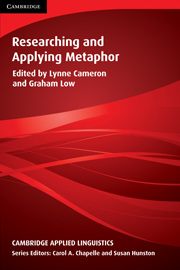Book contents
- Frontmatter
- Contents
- List of contributors
- Acknowledgements
- Conventions
- Series editors' preface
- Preface
- I KEY ISSUES IN METAPHOR RESEARCH
- II FROM THEORY TO DATA
- 4 Getting your sources right: What Aristotle didn't say
- 5 Metaphor and discourse: Towards a linguistic checklist for metaphor analysis
- 6 Identifying and describing metaphor in spoken discourse data
- III ANALYSING METAPHOR IN NATURALLY OCCURRING DATA
- IV ANALYSING METAPHOR IN ELICITED DATA
- References
- Index
4 - Getting your sources right: What Aristotle didn't say
Published online by Cambridge University Press: 05 October 2012
- Frontmatter
- Contents
- List of contributors
- Acknowledgements
- Conventions
- Series editors' preface
- Preface
- I KEY ISSUES IN METAPHOR RESEARCH
- II FROM THEORY TO DATA
- 4 Getting your sources right: What Aristotle didn't say
- 5 Metaphor and discourse: Towards a linguistic checklist for metaphor analysis
- 6 Identifying and describing metaphor in spoken discourse data
- III ANALYSING METAPHOR IN NATURALLY OCCURRING DATA
- IV ANALYSING METAPHOR IN ELICITED DATA
- References
- Index
Summary
Introduction and overview
As at least one influential writer on metaphor has pointed out – and there are few who would disagree with him – it is still the case that “Any serious study of metaphor is almost obliged to start with the works of Aristotle” (Ortony, 1979a: 3). Most studies of metaphor, however, have scarcely a good word to say about Aristotle. The obligation to discuss him is considered to be something of a chore. Such studies always insist that Aristotle undervalued metaphor and believed it to be merely an ornamental extra in language. They also insist that he was ridiculously elitist with respect to metaphor, believing that one had to be a genius in order to use a metaphor properly. Partly as a result of this prevailing negative appraisal, the scholarship contained in these studies tends to be rather shallow. Since Aristotle's account of metaphor is fundamentally wrong, it seems, there is not much point in going into great detail about his views, or in consulting more than one of the texts in which he discusses metaphor.
Shallow scholarship about rich and important sources of work on metaphor and language use, however, can impoverish and, at its worst, seriously bias empirical research on the topic. Moreover, getting your sources right is not merely a valuable end in itself – it may also lead to the discovery of insights which support the claims of your current research, or even to the development of new areas for your critical investigation.
- Type
- Chapter
- Information
- Researching and Applying Metaphor , pp. 69 - 80Publisher: Cambridge University PressPrint publication year: 1999
- 18
- Cited by

